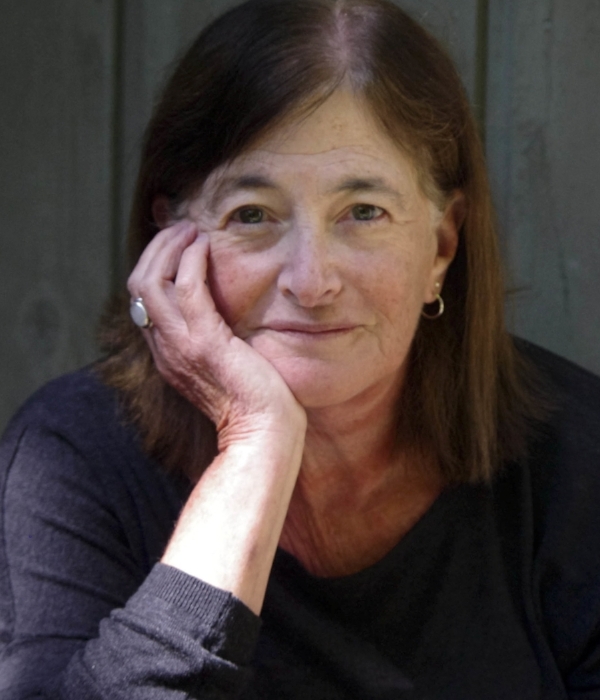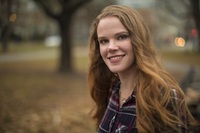Tinderbox Lawn. Carol Guess. Rose Metal Press. Brookline, Maine. 2008.

and
Human-Ghost Hybrid Project. Carol Guess and Daniela Olszewska. Black Lawrence Press. Somewhere in the upper north-east. 2017.
Today's book of poetry is entering uncharted waters. This, our 806th blog/review, is our first post where we have tackled two books, one by a hybrid Human-Ghost, and the other by Carol Guess. That's where we'll start, Today's book of poetry thoroughly enjoyed every second we were in Tinderbox Lawn.
Utterly charming with overshadows of dark and unforgiving wit. Carol Guess beats the craps out of sardonic. Tinderbox Lawn is a conflagration of tidy and tardy prose poems that collectively report on a fractured world.
Tinderbox Lawn is reporting the news of the day and every page feels like a scoop. Think Lois Lane channeling Lucy Riccardo and Anne Sexton. Though untitled, these harmonically connected bon bons and bon mots paint a rather fully textured picture. Guess give us new entry points to our own imaginations.
. . .
We watched the girl through her open window. 45th Street
was hot but she was on fire. We were thinking we should
fuck her as she undressed in front of a face or a mirror. I
said look at her hair, soft. You said look at her lips, bloom.
We'd prepared our room: dog in her cage, silk over skylights
because of the heat. You said she's sweet. I said three's
sweeter. And after we'd take notes on who was better.
Seattle had never been hotter. You had a bottle and I had a
bottle. A building caught fire, rows of condos attached at the
hip. Fire trucks slipped on glossy pavement. Water filled the
moonlit basement. A man flew from a balcony into the air.
Ash stained our hair and the whorls of our dresses. Water
caressed us, the thick blue knife slicing away burnt boards
and glass. We lit cigarettes off the burning grass and breathed
smoke until the streets were clean, the dog lay dreaming,
and you were mine again. Breezes fanned the trees and the
tinderbox lawn. Both the window and the girl were gone.
💥💥💥
Tinderbox Lawn was entirely a first class gas.
Human-Ghost Hybrid Project teams up Carol Guess with Daniela Olszewska, together they conjure the Human-Ghost and the Human-Ghost is another gas altogether. Sublime.
Human-Ghost Hybrid Project is made up of short, prose poems, much like Tinderbox Lawn. Human-Ghost sounds a lot like Carol Guess, but also like someone new, something new, enter Daniela Olszewska. Today's book of poetry doesn't know how these two shared the reins but they sure do gallop. Today's book of poetry does have some experience writing poems with another poet, my associate and I would like to think the results were fruitful. With Human-Ghost Hybrid Project there is no doubt the success of these poems.
Humour makes up a large part of the Human-Ghost mystique but that's just a clever entry point to the radical possible the Human-Ghost seems to champion. There is all sorts of poetry magic happening in these lines. The poems have titles like "Parking Garage Pastoral" and "Watering the Dead", both great titles, stand alone three word poems in fact. Once you get inside this book these poems, sometimes disguised as fables, you see that Human-Ghost has a new paradigm for Human-Ghost world.
Superstition Sale
On Sundays, we set up a fort and sell wind-up woodland animals
painted to look like moral imperatives. Let's try and sustain our
autumnal wet-fruit-wrapped-in-hair-smells. We aren't hapless; we
just dress this way to people will give us a little less guidance. On
Monday, we scrap whatever's unsold: usually crows and tube-nosed
bats and wind-up foxes. We junk their parts for baby seals. No one
wants black cats' eyes or boys raised by wolves.
💥💥💥
Human-Ghost Hybrid Project had much the same affect on Today's book of poetry as the somewhat haunting Tinderbox Lawn. We were wildly amused, animals are named, a text message arrives in a bottle, the flattest robots are revealed and rowboats meet royalty. What more could you ask?
Guess and Olszewsky have, without ego, merged into a single entity, a singular voice, Human-Ghost. Today's book of poetry digs the Human-Ghost and gets off on their clever burn. We can only hope this hybrid hothouse finds time to go exploring again. Witty gets over-used and smart just won't cut it. Carol Guess and Daniela Olszewska do it right.
Eyelet and Eyesore
The boss said prenup, not pre-need.
Here I am, married to my job again.
Sometimes a girl just has to wear white, trip over her veil on the
way to HR.
The honeymoon was downsized off yachts overlooking offshore
accounts.
It isn't easy being smarter than Marketing or negotiating a
rainbow-colored parachute without a ripcord.
Even my dress dressed down on casual Friday, leaving me unlaced
and French-cut in the breast pumping closet.
We down corporate coffee on company time ("we" meaning "me
and peeps at my pay grade").
We passed notes in infrared ("we" meaning "the two secretaries
from Legal").
My dowry was ivy-covered, everyone meant for me to wed up.
Every Halloween, I costume in a new First World Problem.
I love my ability to love whatever loves me back, it makes me stay
slim enough to look good in lace.
All day long, I've been surfing the web for vintage jewelry. My best
friend from college wanted to be an astronaut. I don't know whether
or not I should send her this link about the planet they just
discovered: it's made entirely out of diamonds, it's like four
thousand light years away.
💥💥💥
Today's book of poetry admires this poetry very much, it beyond our imagination to write, but reading it is pure pleasure. Carol Guess and Human-Ghost partner Daniela Olszewska are welcome at Today's book of poetry any time.
Carol Guess

Daniela Olszewska
ABOUT THE POET
Carol Guess is the author of numerous books of poetry and prose, including Darling Endangered, Doll Studies: Forensics, and Tinderbox Lawn. In 2014 she was awarded the Philolexian Award for Distinguished Literary Achievement by Columbia University. Recent BLP titles include With Animal, co-written with Kelly Magee, and Human-Ghost Hybrid Project, co-written with Daniela Olszewska. She is Professor of English at Western Washington University.Daniela Olszewska is the author of three full-length collections of poetry: cloudfang : : cakedirt (Horse Less Press, 2012), True Confessions of An Escapee From The Capra Facility For Wayward Girls (Spittoon Press, 2013), and Citizen J (Artifice Books, 2013). With Carol Guess, she is the co-author of How To Feel Confident With Your Special Talents (Black Lawrence Press, 2014) and Human-Ghost Hybrid Project (Black Lawrence Press, forthcoming).
806
DISCLAIMERS
Poems cited here are assumed to be under copyright by the poet and/or publisher. They are shown here for publicity and review purposes. For any other kind of re-use of these poems, please contact the listed publishers for permission.
We here at TBOP are technically deficient and rely on our bashful Milo to fix everything. We received notice from Google that we were using "cookies"
and that for our readers in Europe there had to be notification of the use of those "cookies. Please be aware that TBOP may employ the use of some "cookies" (whatever they are) and you should take that into consideration.






